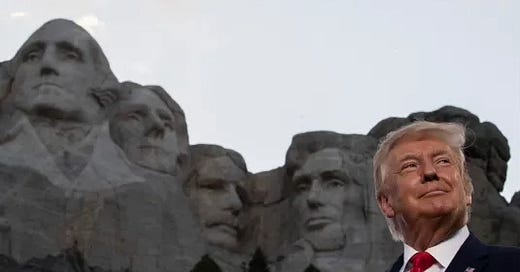"Daddy, We Are Cooked"
a sixth grader's election analysis and the consummation of American democracy
I was sitting in the Rapid City Airport at 6am on Wednesday, November 5, when my daughter, Hannah, calls. “Daddy,” she says, “I saw a headlines.” Hannah and I were up late, as many were the previous night while election results came in. She had been insistent to know who I had voted for. I told her that, as a father of daughters, there was really only one choice, irrespective of any personal preferences on policy positions. “What do you think of the headlines,” I asked her. “Daddy, we are cooked,” she replied with a certainty only a sixth grader can muster.
My sixth grader’s response to the elections is not much different from the response of many I know and love. As a former politician, I understand all too well how election results can impact individuals and communities personally – especially communities and individuals who have suffered historic (and ongoing) oppression at the hands and policies of elected officials. And, as a pastor and priest living among such communities, I recognize that the range of emotions emerging from our political divides takes a spiritual toll as well and requires particular attention and care.
I am not proclaiming the re-election of Donald J. Trump as the “end” of American democracy. Rather, I suspect a second Trump administration may well be the consummation of the American political experiment. What I mean is that every four years, the American public chooses a person to embody the values and the identity of the country at that particular point in our history. In 2024, as in 2016, that person was (and is) Donald J. Trump. Let me be clear, this election wasn’t about policy positions. Anyone who followed the campaigns understands that the candidates were not debating policy; they were debating identity. And the identity that the overwhelming majority of Americans chose to represent themselves was the one proposed by the Trump campaign. An identity created over 250 years of American economic and political policies.
I recall a conversation in a seminary coffee shop in 2018. Many of my East Coast classmates were lamenting the Trump administration as “anti-American.” A friend, Guiamod, from Haiti responded – to the surprise of these seminarians, “It seems to me, Trump is very American.” Guiamond went on to describe the aggressive expansionist policies that have adversely impacted Central and South American countries for most of the 20th and 21st Centuries. It occurred to me, then, perhaps Donald Trump is actually an embodiment of American policies – foreign and domestic – over almost 250 years. He is what our Indigenous siblings and others from the global majority see when they look at the United States. And, whether any of us agrees with those policies or not, whether any one of us agrees with that image of the United States or not, what is clear is that 75,990,111 Americans believed that Donald Trump best reflected their values and the values of the country on November 5, 2024. In other words, by a margin of more than 3 million people, Americans believed that our national image and policies were best represented by a real estate tycoon, turned casino boss, turned reality TV star, turned politician, turned conceited felon.
Back to my daughter. “Why are we cooked,” I asked her. “Daddy, I am an Indigenous woman! We are cooked.” I was stunned. My eleven-year-old daughter had articulated in her “hot take” from the election results what many of my well-educated, affluent seminary classmates struggled to understand. A president who embodies a country’s policies of child, land, and resource removal – in the name of American “progress” and the Almighty dollar – is a threat to all who are on the margins of the power and privilege those policies. Which raises a legitimate question of who is included in those protections of the Declaration of Independence, the guarantees of “life, liberty, and the pursuit of happiness”? Are the Indigenous communities I serve? Are the Lakota grandmas who have cared for me over the last 30 years? Are the Diné aunties, uncles, sisters, and brothers I come to love over the last five years? Is my Indigenous daughter? Needless to say, as a casino developer, Donald J. Trump once questioned whether he had “more Indian blood than a lot of the so-called Indians that are trying to open up the reservations” – his direct competition. As President, Trump expedited projects that directly threatened Indigenous lands like the Dakota Access Pipeline and reduced the sacred Bears Ears Monument by 85%.
So, when I consider whether the election of Donald J. Trump is the end of American democracy, it occurs to me that, perhaps our American political institutions are doing exactly what they were designed to do. Those institutions are promoting the economic interests of an elite class of powerful and privileged White men to exclusion of those who are not. And those lands and peoples who stand in the way are simply expendable – a cost of doing business – sacrificed on the altar of American progress. Are we facing the end of American democracy or the consummation of it?





Stated differently, can we disavow the outcome of the election without disavowing the policies and principles that created the candidate who won?
Hi Joe, so much for speaking truth to power and working within a system to educate & expand understanding and empathy for neighbors. Found it difficult to click the ❤️ … still allowing myself to re-align somehow. As I regather, aim to continue working toward right relationships with indigenous peoples and for those who are in prisons or detained. Your daughter’s sentiments land squarely with me. As a white woman, married 39 years + to a black man, it is clear that we are entering a very dangerous time for any and all who are in the margins.